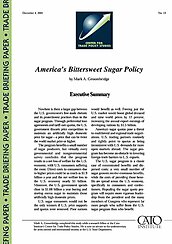America’s sugar quotas pose a threat to multilateral and regional trade negotiations. U.S. trading partners routinely and rightly point to quotas as being inconsistent with U.S. demands for more open markets abroad. The sugar program has become an obstacle to lowering foreign trade barriers to U.S. exports.
The U.S. sugar program is a classic case of concentrated benefits and dispersed costs: a very small number of sugar growers receive enormous benefits, while the costs of providing those benefits are spread across the U.S. economy, specifically to consumers and confectioners. Repealing the sugar quota program will require more vigorous leadership from the president and the many members of Congress who represent far more people who suffer from the U.S. sugar program than who benefit.


